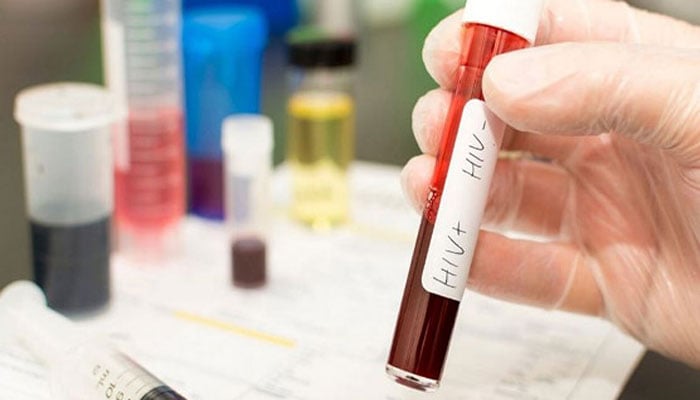WHO declares HIV outbreak in Larkana as ‘Grade 2 Emergency’
Calling for immediate availability of ART medicines for the 751 HIV positive people (now 761 as of June 08, 2019), WHO Situation Report says there is an urgent need of Anti-Retro Viral medicines, Rapid HIV Diagnostic Kits (RDTs), medicines for treatment of co-infections, human resource & training for health workers, provision of psychosocial support and training health workers and strengthening of Infection Prevention and Control at health facilities.
Karachi: Declaring HIV outbreak in Ratodero area of Larkana as a “Grade 2 Emergency”, World Health Organization (WHO) has said that inadequate stock of Antiretroviral Therapy (ART/ARV) medicines has emerged as the major challenge for Pakistan where the current stock of ARVs is only sufficient to meet the needs of 240 children till 15th July 2019.
“Major challenge to access to ARVs is inadequate stock of ARVs in the country. The current stock available is sufficient to meet the needs of 240 children only till 15th July 2019, of which 231 are already getting treatment which means that only 9 additional children can be enrolled on treatment”, says a WHO Situation Report titled “Pakistan: HIV Outbreak in Larkana District Sindh”, which was released on June 03, 2019.
Calling for immediate availability of ART medicines for the 751 HIV positive people (now 761 as of June 08, 2019), WHO Situation Report says there is an urgent need of Anti-Retro Viral medicines, Rapid HIV Diagnostic Kits (RDTs), medicines for treatment of co-infections, human resource & training for health workers, provision of psychosocial support and training health workers and strengthening of Infection Prevention and Control at health facilities.
Compiled by a Rapid Response Team comprising international epidemiologists, public health experts, infection control specialists and others who flew to Pakistan from different countries on the request of Federal Ministry of National Health Services, the WHO Situation report says 26,041 people were screened for HIV in Ratodaro Taluka, district Larakana, Sindh.
“Around 751 (2.9%) of the people were tested positive for HIV including 604 children, 135 adults while age of 12 was unknown. As many as 531 (70%) are linked to ART centre including 443 children and 94 adults. Only 324 (43.1%) are receiving Anti-Retroviral Treatment at the moment”, the WHO Situation Report says.
Expressing its dissatisfaction over standard of screening, the WHO Situation Report says in some screening camps in Larkana district, WHO recommended standard for testing is not being implemented due to unavailability of recommended test kits, saying the current WHO guidelines on HIV treatment recommends test and treat strategy.
Possible drivers of the outbreak
The WHO team of experts believe the possible drivers of the outbreak could be ‘unsafe practices of blood transfusion’, ‘re-use of injection needles and syringes’, ‘mother to child transmission’, ‘improper disposal and reuse of hospital waste, ‘tattooing using unsafe needles’, ‘circumcision in males using unsafe blades’ and ‘ear and nose piercing using unsafe needles’.
Funding Gap
The WHO Situation Report says it requires US$ 1.5 million or Rs. 225 million to deal with the health emergency in Ratodero Taluka of Larkana but the available funds are only US$ 200,000 through CFE thus the gap in funding is around US$ 1.3 million or Rs. 195 million.
It is worth mentioning here that the Global Fund to Figh Aids, Tuberculosis and Malaria has pledged to provide Anti-Retro Viral medicines for the newly-diagnosed HIV positive people but also urged the government of Pakistan start an indigenous plan to provide ARTs/ARVs for their rest of lives.
WHO Response
The report further says on the request from government of Pakistan, WHO constituted an ‘Incident Management Team’ to respond to HIV outbreak in district Larkana, Sindh, helped local authorities in HIV data cleaning and analysis and donated 5 IEHK kits to the district of Larkana to support management of opportunistic infections.
“The Government of Pakistan requested WHO to support the provincial health department to conduct a comprehensive investigation of the current HIV outbreak/upsurge in Larkana. As a follow up of this request WHO constituted and deployed a team of experts comprising of among others; epidemiologist, pediatric HIV treatment experts, supply chain management experts and laboratory experts”, the situation report says adding that objective of the deployment of the mission is to investigate the outbreak and to provide recommendations.
Currently the team is in the field and preliminary report of their findings is expected in mid-June 2019, the situation report says.
Way Forward
The WHO team of experts urged the provincial health authorities to introduce systematic screening of HIV in the affected areas, conduct awareness and health education sessions in communities about HIV/AIDs targeting at risk groups, linking HIV confirmed cases with available treatment sites and train health workers on pediatric case management
Similarly, the WHO calls for immediate procurement and provision of RDTs and ARVs and international support for provision of HIV services targeting the at risk groups.
-
Jelly Roll explains living with 'severe depression'
-
Charli XCX reveals ‘confusing’ toll ‘Brat’ popularity took on her
-
Margot Robbie opens up about imposter syndrome ‘crisis’
-
Hailey Bieber reveals how having ovarian cysts is 'never fun'
-
Sir Elton John details struggle with loss of vision: 'I can't see'
-
What we know about Chris Cornell's final hours
-
5 famous celebrities who beat cancer
-
Oprah Winfrey talks about weight-loss 'tool to manage' health












